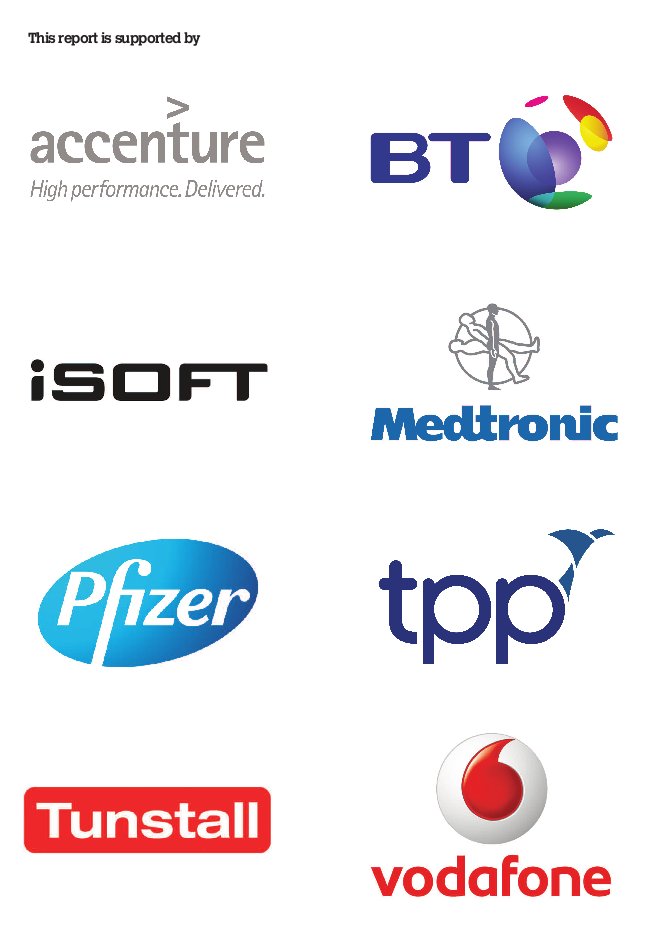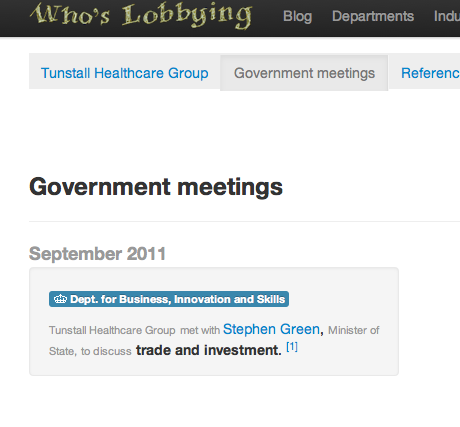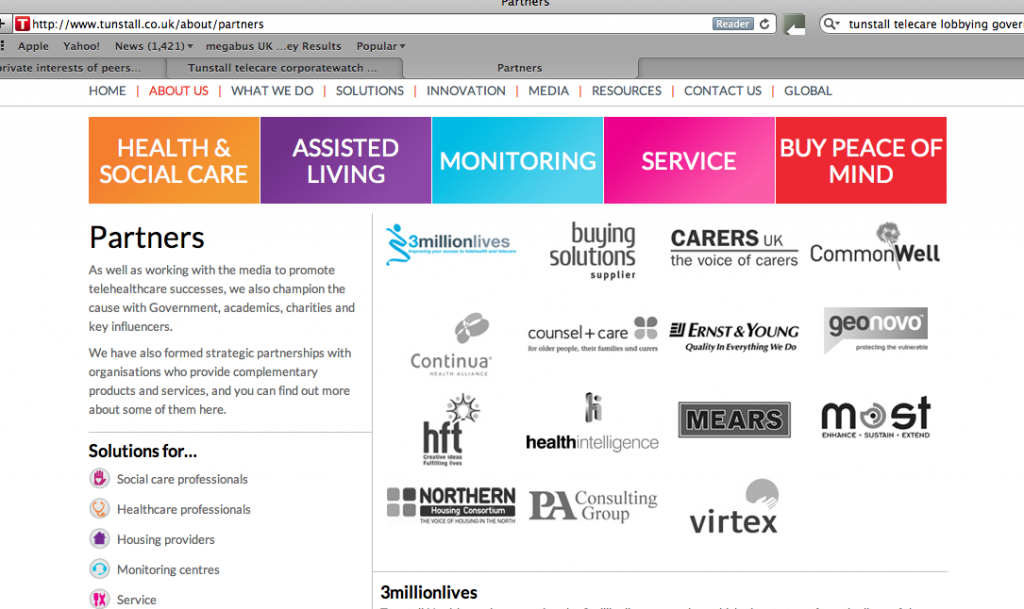Here is how a private company goes about dismantling and profiteering from a much-loved public service, in five easy stages.
Pay for positive spin in a pro-market think tank report
In 2010 Tunstall Healthcare was one of an assortment of private healthcare companies that funded a report on telehealthcare, ‘Healthcare Without Walls: A framework for delivering telehealth at scale’, written by the pro-privatisation think tank, 2020 Health.
Social Investigations reports that 2020 Health has strong links with the Coalition Government and key politicians who were involved in pushing through the Health and Social Care Act 2012.
The Parliamentary Under secretary for Health Earl Howe, a former banker who led the Health and Social Care bill proceedings in the House of Lords, was a 2020 Health patron – although he didn’t declare this until the 2010 election, when he stood down from his formal, previously unacknowledged relationship with 2020 Health.
The Royal College of Physicians (RCP) is now investigating whether to expel Earl Howe from his advisory position with the RCP, on the grounds that he falsely advised doctors that the Health and Social Care Act would not force them to put NHS services out to tender.
Other Conservative and LibDem politicians and peers were involved in 2020 Health at the time of the Tunstall-sponsored telehealthcare report:
- the Chairman of the think tank Tom Sackville,
“a former Conservative minister and Parliamentary Under–Secretary for Health who is the Chief Executive of the International Federation of Health Plans, which represents one hundred private health insurance companies in 31 countries”.
- Liberal Democrat Peer, Lord Clement-Jones, a partner for DLA Piper, who provide lobbying, public affairs and trade policy services as well as advice on how to get access to public service delivery contracts.
- Baroness Cumberlege, a Conservative peer who runs her own training and consultancy company called Cumberlege Connection. Before the Health and Social care bill became an Act, she joined an alliance led by Pricewaterhouse Cooper, developing the new Clinical Commissioning Groups. Social Investigations reports that, in response to a complaint placed with the Commissioner for Standards, she said
‘Disappointingly since joining the alliance Cumberlege Connections has not earned any income through the alliance.’
Despite these political connections and the fact that the report was funded by telehealth and telecare companies, ‘Healthcare Without Walls’ announces itself as
“an independent report designed to inform the future NHS strategy for telehealth.”
It states that the the Coalition Agreement’s NHS White Paper “Equity and Excellence – Liberating the NHS” and the outcome of the 2010 Comprehensive Spending Review
“all signal vast changes to our NHS and public services…the White Paper creates the environment in which the demand for telehealth-enabled services can be fostered.”
Open the door to the American “Health Maintenance Organisation” Kaiser Permanente
2020’s “Healthcare without Walls” Report makes great claims for telehealthcare, with much reference to the American Health Maintenance Organisation (HMO), Kaiser Permanente. Kaiser Permanente HMO is basically a health insurance company that controls hospitals and other medical premises, staff and insurance.
Although this makes it seem quite like the NHS (except that the NHS is funded by National Insurance and taxation, not privately-paid insurance), Kaiser is a market organisation with a strong commercial culture and a track record of cherry picking wealthy communities and closing down facilities in poor areas in order to avoid having to provide healthcare to uninsured patients who suffer from the increased health problems associated with poverty.
In their book The Plot Against the NHS, Colin Leys and Stewart Player describe how Kaiser Permanente strongly influenced New Labour’s NHS reforms from 2000, when a former Kaiser Permanente employee started work as Director of Strategy in the Department of Health. (p 30).
Despite health policy experts pointing out that claims for the cost effectiveness of Kaiser Permanente’s model of ‘integrated care’ were based on wrong arithmetic,
“the government went on to invest considerable resources in promoting Kaiser as a model for the NHS to follow” (p57)
This included the emphasis on telehealthcare for managing chronic long term conditions like COPD, diabetes, heart failure and musculoskeletal disease.
Noting that
“At this stage, the government has yet to whole-heartedly endorse the use of telehealth”,
the Tunstall-sponsored 2020 Health think tank report says that telehealth should
“underpin the transformation outlined in the NHS White Paper”
It calls for
“ firm strategic leadership here from the Coalition, together with key enabling actions under the authority of the National Commissioning Board.”
In a display of spin that could put Malcolm Tucker in the shade, the 2020 telehealthcare report, claims “success” for the Tunstall North York and Yorkshire PCT telehealth programme in importing the Kaiser integrated care model into the NHS.
The fact is that 4/5ths of the £3.2m teleheath gadgets stayed in their boxes in a bonded warehouse and the PCT audit concluded that there was no justification for the contract, which had been awarded without any business case being carried out.
But the 2020 Health report claimed:
“The success of the programme has centred on a process of whole pathway redesign, across primary, community and acute sectors, assessing where telehealth can be used as an enabler to improving outcomes. This has created a greater understanding of the importance of the pathway and has highlighted some difference in service provision, helping to start the transformation of community services…there have been tangible improvements in understanding between providers of care and an increased ability to work together across boundaries.” (p36
Private health care company directors and advisers in Parliament ignore conflict of interest rules
In April 2011, Tunstall CEO Gil Baldwin, who replaced former CEO Jim Buckley after Charterhouse Capital Partners had acquired the company, publicly supported the Coalition Government’s Health and Social Care Act 2012.
According to Healthcare investment analyst William Laing, the Health and Social Care Act has
“opened up the market”
to a
“land grab”
by private healthcare companies. The head of Bain & Company’s UK Healthcare Private Equity practice, which helps companies to take part in this “land grab”, said
“Now the rules of the game are changing. We can compete for all of the NHS budget on equal terms. What was traditionally locked up in the NHS is going to become available to the private sector.” (Financial Times)
Tory Lord Patten, a senior adviser at Charterhouse Capital Partners, the private equity company that owns Tunstall Healthcare, is one of more than a hundred members of the House of Lords with links to private health care companies.
Goldman Sachs, KPMG and LEK, three companies which also have Lords in senior positions, were also involved in the Charterhouse Capital Partners’ purchase of Tunstall Healthcare. Lord Griffiths is a director at Goldman Sachs; Lord Harris is a senior advisor at KPMG, and Lord Wakeham is an adviser to LEK Consulting, which specialises in helping private healthcare companies identify “growth and new business development” and “opportunities with the government“.
Despite this clear conflict of interest, Lord Patten and the other peers were nonetheless allowed to vote on the Health and Social Care Act 2012. Lord Patten and the other three Lords associated with companies involved in Charterhouse Capital Partners’ buy out of Tunstall Healthcare all voted in support of the Act.
Privatise the NHS for the benefit of UK plc
As well as part-funding 2020‘s pro-NHS privatisation report, Tunstall Healthcare hired lobbyist company MHP Communications from Sep 2010- Feb 2012.
Between Dec 2011-Feb 2012 Tunstall also hired lobbying company Connect Communications.
In September 2011 Tunstall Healthcare had a lobbying meeting with Steven Green, Minister of State at the Department for Business, Innovation and Skills, to discuss “Trade and Investment”.
The Department of Health was working with the Department of BIS on shaping the market for telecare and telehealth products and removing barriers to new technology entering the market, including assisted living.
The story isn’t finished. In December 2011, David Cameron announced that the government would put £180m of public money into funding telehealthcare techology development as part of a new life sciences strategy.
Despite the fact that only interim data was available for the Whole System Demonstration programme, Cameron announced it had been a great success – although later, the final results showed otherwise. Something of a pattern establishing itself here.
Meanwhile, most of the Tunstall Healthcare telehealthcare gadgets that the NYY PCT had bought for £3.2m of our money were gathering dust on the shelves of a bonded warehouse.
Regardless, David Cameron announced that the Department of Health would roll out telehealth nationally as the 3 million lives project – referring to the number of people the DoH had figured that telehealthcare could benefit
The 2020 Healthcare Without Walls report, paid for by Tunstall and other private telehealthcare suppliers, appears to have done its job. Its call for
“firm strategic leadership here from the Coalition, together with key enabling actions under the authority of the National Commissioning Board”
was answered by David Cameron’s announcement that the government’s new Life Sciences Prospectus aimed to develop a
“world-leading system in technology adoption”.
And the Life Sciences Prospectus said that the government was committed to removing barriers to the use of teleheath and telecare technology in the health service and that telehealth systems would be widely rolled out:
“For high impact technologies that have demonstrated clinical effectiveness, such as telehealth, the NHS Commissioning Board will accelerate adoption throughout the NHS
…This will be done in partnership with industry using a new approach that will aim to deliver this technology across the country to improve 3 million lives over the next five years.”
Create a cartel like 3 million lives
Accelerated telehealthcare adoption throughout the NHS, driven by the NHS Commissioning Board “in partnership with industry using a new approach” sounds as if it could be a bit dodgy.
These are the NHS Commissioning Board’s “industry partners” – including Tunstall Healthcare, who showcased their logos on its website:
3 million lives is based on a “concordat” – a polite word for “cartel” – that commits the Department of Health to working with Medilink and other trade associations in order to speed up NHS use of telehealth and telecare.
Medilink UK’s Chairman Tony Davis said:
“…there are many Medilink members who stand to benefit hugely from the ‘3millionlives’ campaign… By joining together, and by working with the Department of Health, they will be in the ideal position to take commercial advantage of the opportunities as they become available.”
In order to be part of the 3 million lives “concordat”/cartel, Medilink telehealthcare and telecare businesses have to pay £10k, according to the 3 million lives Memorandum of Understanding, which also says that futher funding may be requested for events and campaigns.
Telehealth and Telecare Aware’s reasonable conclusion about 3 million lives was ,
“We think this is a Tunstall-driven scheme which has come about as the result of its Parliamentary lobbying activities…Who is really going to benefit?… It looks like an exercise by the large companies to exclude the smaller ones from the market. If they establish the 3ML branding in the NHS as representing ‘trusted’ or ‘government approved’ suppliers then the effect will have been to create a market that excludes us. In effect, it’s a cartel.”
The Minister of State for Care Services, Paul Burstow MP, is the main 3 million lives supporter within the Department of Health. His speech to the 2012 International Congress on Telehealth and Telecare, included a buddy-buddy promotion of Tunstall Healthcare.
This still isn’t the end of the story. There’s more to follow: Calderdale’s NHS has stumbled further down the stealth privatisation road by awarding a 12 month, £364K contract for telehealth and telecare to Tunstall Healthcare.




